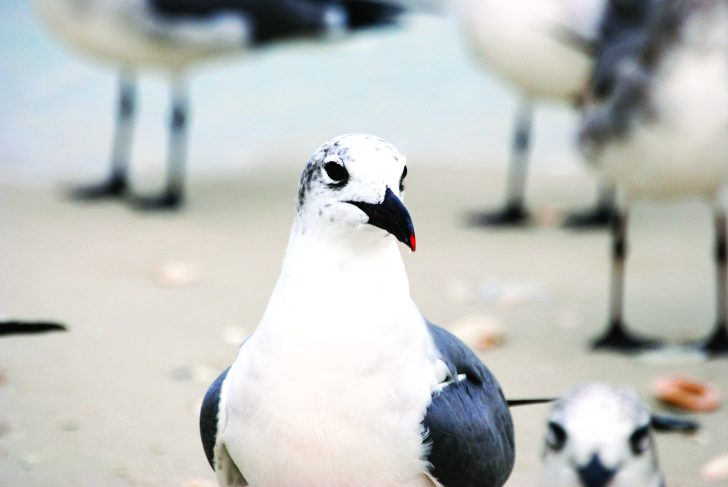When is a seagull not a seagull? When it isn’t by the sea.

They are found on lakes, in parks, in cities, and even at landfills. So, if they aren’t seagulls, what should we call them?
Five gull species are common in Florida, with Laughing Gull the most numerous. Named for their habit of throwing back their head and emitting a laugh-like outburst, Laughing Gulls nest right on the sand, usually in large colonies. They are easily recognized in breeding season (spring and summer) by their black hood and deep red bill, but in winter their head becomes mostly white.
Laughing Gulls have large feet, good for walking long distances on the sand in search of food, which includes fish, crustaceans, insects, eggs, carrion, and sometimes baby birds.
Ring-billed Gulls, Bonaparte’s Gulls, and Herring Gulls are also found on Florida’s shores, as well as several other species of compact white bird lumped in that “seagull” misnomer called terns.
Terns are gull relatives with shorter legs and a forked tail when seen in flight. These birds do less scavenging and spend more time in the air, frequently plucking their food from the water’s surface. Sandwich Terns are here year-round while dainty Least Terns wrap up their nesting season in August and depart for South America. There’s also Common Terns, Royal Terns, Caspian Terns, and more, many of which migrate to Florida from northern breeding areas and spend winters with us.
Any time of year, beach birds can benefit when we are thoughtful about where we recreate and how we manage our food and trash. Some tips:
• Don’t force birds to fly. Birds in flight expend energy they need for survival.
• Keep out of posted areas and encourage others to respect them too.
• Keep dogs off the beach where prohibited, leashed on beaches where they are allowed, and far away from nesting birds.
• Don’t feed the birds at the beach. It will attract predators to eggs and chicks.
